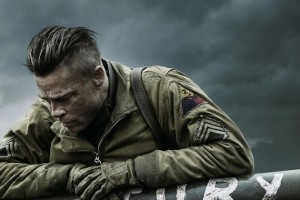Metro Canada – Reel Guys: Fury “claustrophobia, tension and fear percolates.”
 By Richard Crouse & Mark Breslin
By Richard Crouse & Mark Breslin
Synopsis: Set in April 1945, the movie sees hard-bitten commander “Wardaddy” Collier (Brad Pitt) lead a U.S. 2nd armored division tank nicknamed Fury through Germany in the final days of World War II. His crew, “Bible” Swan (Shia LaBeouf, once again acting opposite giant machines), Gordo (Michael Peña) and redneck Grady (Jon Bernthal), have fought together since the beginning of the war. When Norman Ellison (Logan Lerman), a new gunner recruit with no battle experience, signs on, he must fit in or endanger the entire crew. “You are no use to me if you can’t kill krauts,” says Wardaddy.
Star Ratings:
Richard: 4 Stars
Mark: 4 Stars
Richard: Mark, Fury is a brutal war film with exciting and well-executed battle sequences, but its most vicious scene takes place over a meal, at a table set with a lace tablecloth. It happens midway in the film after the crew has captured a German town. Once the bullets stop flying two local women prepare a meal for Wardaddy and Norman. The long scene begins with tension as the German ladies try and figure out if the Nazi hunters mean them harm but when the core group crowds around the table it becomes something akin to a surreal family dinner where real humanity, or lack thereof, is laid bare. It could have stopped the movie dead in its tracks, but instead is a welcome interlude that showcases the effects of battle on a tightly knit but disparate group of men.
Mark: Yes, Richard, it’s an excruciating scene, and I mean that in the best way. What I liked about it was the way it disposed of the “greatest generation” mythology and showed American soldiers as borderline rapists and sadists. Not Pitt, of course, who is just and fair, but some of the soldiers who saved us from the Nazis were swine themselves. It is a depressing irony in a film that’s too tough for irony. I admired the general toughness of the movie; war is not glamourized, it’s shown to be a cesspool of degradation, a literal mud bath. I can’t even imagine what the mud budget was for the picture.
RC: The mud budget and the cost of the fake body parts that litter the battlefield must have rivalled Pitt’s salary. Those are the details, however, that give the movie so much of its grit. The dinner scene helps open the movie up and keep it from becoming Das Boot on land, but I was fascinated by the tank interiors. A sense of claustrophobia, tension and fear percolates inside the tank cab and literally bleeds off the screen. It helps that the performances are very strong, but it’s the primal feeling of being trapped inside the small space that gives the movie much of it oomph.
MB: Yes, I couldn’t get into the elevator after I saw the film. The performances are strong, as you say, and I was most impressed by Shia LaBoeuf, who we can now all forgive for all those Transformers movies. Michael Pena is great, but he’s always great. A real surprise is Jon Bernthal, a relative newcomer, who nails his southern-fried redneck character as a man you equally hate and pity. And what did you think of Pitt, Richard?
RC: Pitt really pulls this off. At first I was concerned he was going to hand in a rehash of his Nazi hunting character from Inglourious Basterds. That character was over-the-top, and so is this one in his own way. Much of his dialogue sounds like it was written by Quentin Tarantino, but the character is deeper, not so much in what he says, but in his quiet scenes when everything you need to know about him is written on his face.
MB: The sadness is even in his haircut, which has its own gravitational pull.
